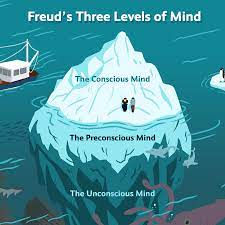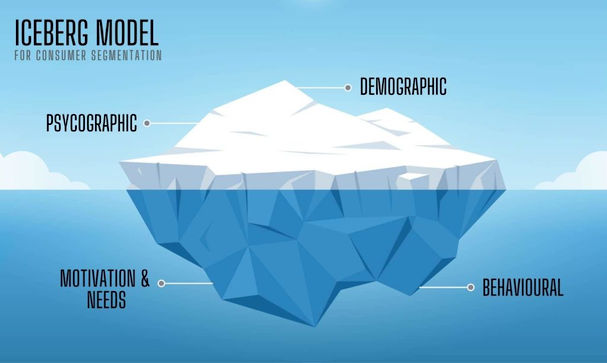ICEBERG METHOD
personal writing
05.18,2021
When we look into the deep motivation, we noticed that making our products or services successful means understanding the deepest part buried underneath the surface.
One of the most important things for marketers or business owners is to be crystal clear on their target audience. We learned that in order to look for the target audience, we should identify the target groups’ gender, age, location, or any other demographic information. If we delve further, there is an additional crucial information that could assist marketers in understanding their consumers’ deeper motivation. To do that, we use the method called Iceberg Method.
Iceberg theory is created by a famous psychoanalyst, Sigmund Freud. He articulated our mind is like an iceberg, which depicted the motivation and the structure of the subconscious (McLeod, 2015 ).

As we can see from the picture above, the top of the iceberg that we can see above the water represents our conscious mind. So from a marketing point of view, that is where we see the demographic information of our audience.
If we dig deeper, the preconscious mind is where the submerged part of the iceberg below but is still apparent. It portrays psychographic data, such as interests, hobbies, and lifestyle choices.
However, the actual reason consumers take action to purchase is the unconscious, which is the most of the iceberg that lies underneath the water unconsciously triggers their motivation. The examples of the unconscious mind could be beliefs, biases, values, feelings, dreams, risks, traditions, and motivations and emotions.
Given in a scenario: a person (we named her ‘Alice’) is going to a coffee shop in the morning that is not on her way to work. She is constantly overworked, and this is her way to enjoy her day ahead of work. Plus, Alice prefers organic coffee as she worries about her health from a stressful job and lack of sleep. Suppose we include the other psychological theories on motivation and emotions. In that case, Alice might be adopting an avoidance temperament because of the coffee shop’s anti-marketing method advertisement about supporting small local businesses. On the other hand, she is a supporter, and she feels good for supporting small local businesses. Therefore, that unconsciously affects her decision to visit the coffee shop even though it is not en route to work.
Reference
McLeod, S. A. (2015). Unconscious mind. Simply Psychology. https://www.simplypsychology.org/unconscious-mind.html
